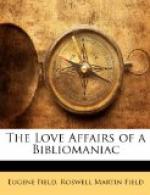Frederick Saunders observes that, like Milton in his blindness, Bunyan in his imprisonment had his spiritual perception made all the brighter by his exclusion from the glare of the outside world. And of the great debt of gratitude we all owe to ``the wicked tinker of Elstow’’ Dean Stanley has spoken so truly that I am fain to quote his words: ``We all need to be cheered by the help of Greatheart and Standfast and Valiant-for-the-Truth, and good old Honesty! Some of us have been in Doubting Castle, some in the Slough of Despond. Some have experienced the temptations of Vanity Fair; all of us have to climb the Hill of Difficulty; all of us need to be instructed by the Interpreter in the House Beautiful; all of us bear the same burden; all of us need the same armor in our fight with Apollyon; all of us have to pass through the Wicket Gate—to pass through the dark river, and for all of us (if God so will) there wait the shining ones at the gates of the Celestial City! Who does not love to linger over the life story of the `immortal dreamer’ as one of those characters for whom man has done so little and God so much?’’
About my favorite copy of the ``Pilgrim’s Progress’’ many a pleasant reminiscence lingers, for it was one of the books my grandmother gave my father when he left home to engage in the great battle of life; when my father died this thick, dumpy little volume, with its rude cuts and poorly printed pages, came into my possession. I do not know what part this book played in my father’s life, but I can say for myself that it has brought me solace and cheer a many times.
The only occasion upon which I felt bitterly toward Dr. O’Rell was when that personage observed in my hearing one day that Bunyan was a dyspeptic, and that had he not been one he would doubtless never have written the ``Pilgrim’s Progress.’’
I took issue with the doctor on this point; whereupon he cited those visions and dreams, which, according to the light of science as it now shines, demonstrate that Bunyan’s digestion must have been morbid. And, forthwith, he overwhelmed me with learned instances from Galen and Hippocrates, from Spurzheim and Binns, from Locke and Beattie, from Malebranche and Bertholini, from Darwin and Descartes, from Charlevoix and Berkeley, from Heraclitus and Blumenbach, from Priestley and Abercrombie; in fact, forsooth, he quoted me so many authorities that it verily seemed to me as though the whole world were against me!
I did not know until then that Dr. O’Rell had made a special study of dreams, of their causes and of their signification. I had always supposed that astrology was his particular hobby, in which science I will concede him to be deeply learned, even though he has never yet proved to my entire satisfaction that the reason why my copy of Justinian has faded from a royal purple to a pale blue is, first, because the binding was renewed at the wane of the moon and when Sirius was in the ascendant, and, secondly, because (as Dr. O’Rell has discovered) my binder was born at a moment fifty-six years ago when Mercury was in the fourth house and Herschel and Saturn were aspected in conjunction, with Sol at his northern declination.




